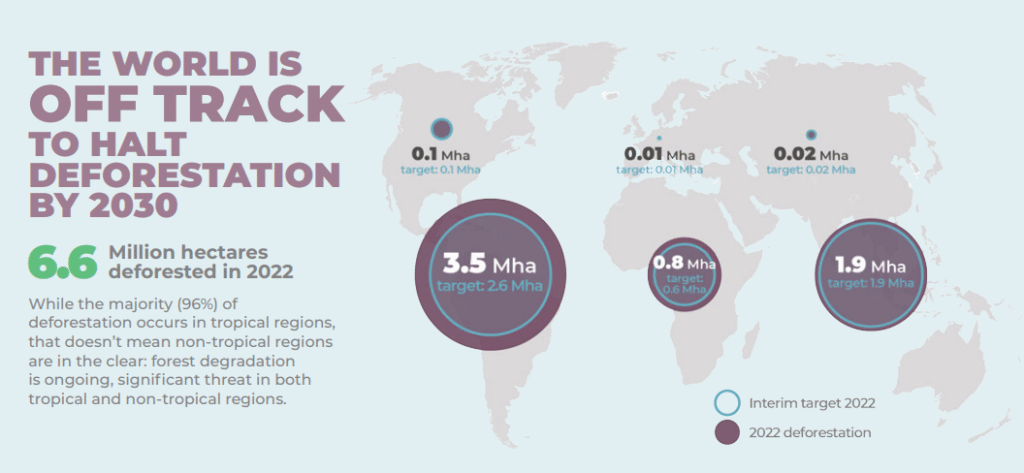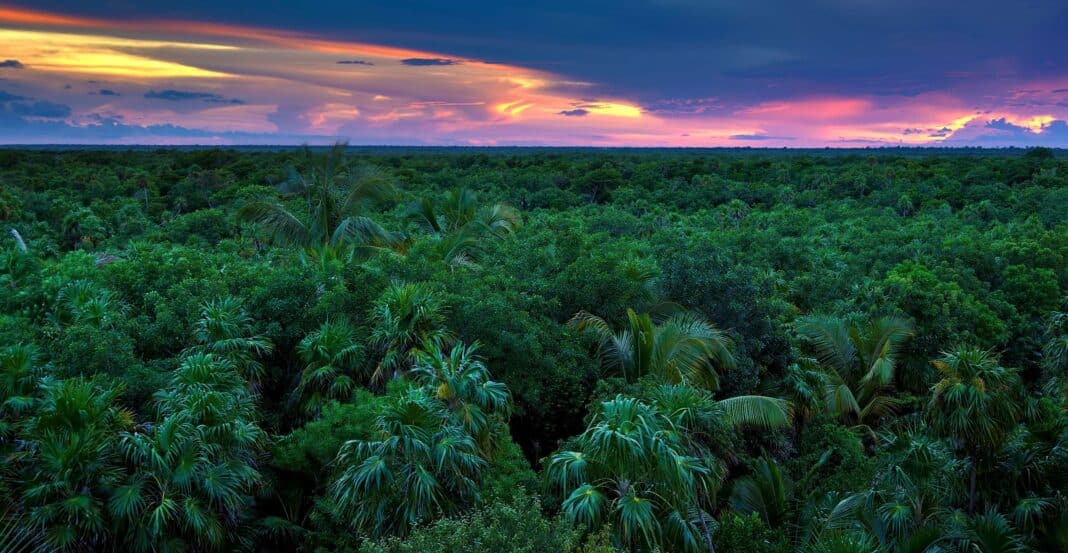More than 6.6 million hectares of forest were lost to deforestation in 2022, an increase of 4% compared to 2021, according to Forest Declaration, a coalition of environmental organisations.
According to its most recent assessment, “Off Track and Falling Behind”, it claims the rate of deforestation was “21% higher than needed to eliminate deforestation by 2030.”
For the first time, the report offers a comprehensive blueprint for saving forests, “defining for the first time the pathways to stop destroying forests, to meet global commitments and bring our forests back to life,” according to co-author Mary Gagen from the WWF-UK.

It supports research from the University of Maryland that reported that an area of tropical forest the size of Switzerland was lost last year as tree losses surged.
The report’s title references commitments made by over 100 global leaders at COP26 to end deforestation by 2030.
Supporting the assessment, the WWF released a report overnight outlining the steps needed to halt deforestation – calling for countries to end harmful subsidies and change international trade systems to halt salt of deforested products.
“Why is the world still barrelling in the wrong direction on forests every year? The answer becomes obvious if you look at what we invest in,” according to Erin Matson, who co-authored the assessment.
“We are investing in activities that are harmful to forests at far higher rates than those that are beneficial for forests.”
However, the report is not all bad news, with bright sparks emerging in the Asia-Pacific.

Last week, Wood Central reported that Australia and China are leading the world in reforestation, with the FAO reporting growth rates of 1,937,000 hectares and 446,000 hectares per year.
“Oceania recorded the second-largest average annual net gain in forest area (after Asia) in 2010–2020, at 423 000 hectares, reversing the region’s negative trend of previous decades,” the FAO reported.

The new report claims that “well over 50 countries are on track to eliminate deforestation within their borders by 2030.”
“For instance, in tropical Asia, the only region close to the pathway for achieving zero gross deforestation, Indonesia and Malaysia have achieved sustained reductions in deforestation.”

Indonesia, for example, has reduced primary tropical forest loss more than any other country since recording an all-time high in 2016.
It’s a similar story in Malaysia. In both countries, oil palm corporations are acting, with some 83% of palm oil refining capacity now operating under no deforestation, no peatland and no exploitation commitments.
In Sarawak, Malaysia’s most extensive state forests cover 91% of its land area – or about 9.57 million hectares of forest area. In 2022, it lost 59,000 hectares of natural forests, a drop of almost 300% from a decade ago.
“Both developed and developing countries have demonstrated the transformative power of political will and dedicated action.”
“Their efforts have led to dramatic and, in some cases, sustained reductions in deforestation rates,” the report said.
According to Ms Matson, of the 6.6 million hectares lost last year, 4.1 million hectares were primary forest.
“These are the irreplaceable old-growth forests, which are priceless.”
But deforestation ‘isn’t the only issue, she says.

The remaining forests are degraded in North America and Europe thanks to wildfires and partial logging.
“We hardly ever talk about the fact that forests in these regions, and every world region, are not just being cleared, but where they are still standing, they’re losing carbon, their structural integrity, losing biodiversity year after year,” Ms Matson said.
The WWF is now calling for governments to stop investing in and subsidising activities causing deforestation and encourage activities that help forests.
For example, “there is abandoned farmland in Brazil that could be put back into production with some investment,” Ms Matson said, “which would lessen the pressure to cut down more forest.”
It also claims that trade reform is needed – with the EU Deforestation Regulation taking the lead in ensuring that deforested products are eliminated from all global supply chains.
“It shouldn’t be left to consumers to try to work out if the products they buy are forest friendly or not”, according to Mike Barrett from the WWF UK.
Governments should ensure that products that drive deforestation are unavailable in consumer markets.
“We should be able to buy any products in the UK knowing that they are deforestation-free.”






